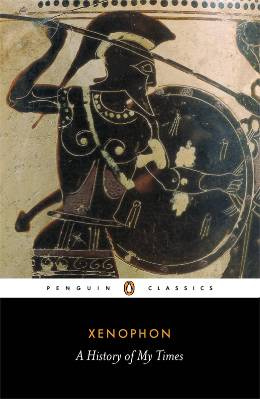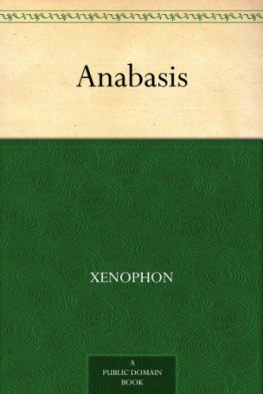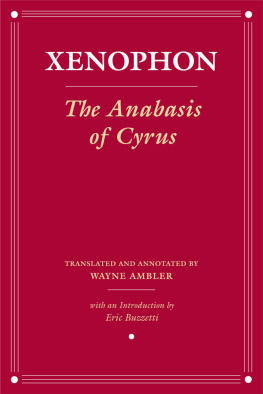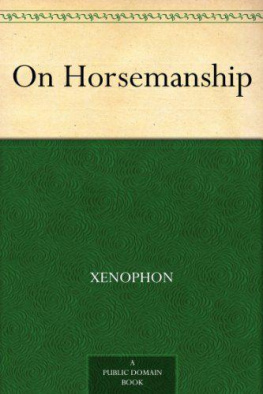PENGUIN BOOKS
HIERO THE TYRANT
AND OTHER TREATISES
XENOPHON was an Athenian country gentleman born in the early 420s BC . He may have helped to publish Thucydides History and certainly wrote his own Hellenica, also known as A History of My Times, as a continuation of it. By his own (probably reliable) account he was a fine officer and outstanding leader, but his admiration for Sparta and devotion to Socrates led to his banishment. He was given an estate at Scillous, near Olympia, and settled down to enjoy the life of a landed aristocrat under Spartan protection, and it was during this period that he began to write histories, biographies, memoirs and specialist treatises. Events forced him to move to Corinth in 371, but he was allowed to return to Athens in 365, where he lived until his death in the late 350s.
ROBIN WATERFIELD was born in 1952. He graduated from Manchester University in 1974 and went on to research ancient Greek philosophy at Kings College, Cambridge. He has been a university lecturer (at Newcastle upon Tyne and St Andrews) and both copy-editor and commissioning editor for Penguin Books. He now makes a living as a self-employed writer and consultant editor. His publications range from academic articles to childrens fiction, and he has translated various Greek philosophical texts, including (for Penguin Classics) Xenophons Conversations of Socrates, Plutarchs Essays, Platos Philebus and Theaetetus and (in Platos Early Socratic Dialogues) Hippias Major, Hippias Minor and Euthydemus. He also edited The Voice of Kahlil Gibran for Penguin.
PAUL CARTLEDGE was born in 1947. He was an undergraduate and junior research fellow at Oxford, where he took his D.Phil. in early Spartan archaeology and history under Sir John Boardman. He has taught since 1979 at the University of Cambridge, where he is ad hominem Professor of Greek History and a Professorial Fellow of Clare College and a Life Fellow of Clare Hall. His publications include Agesilaos and the Crisis of Sparta (Duckworth and Johns Hopkins University Press, 1987), Nomos: Essays in Athenian Law, Politics and Society (Cambridge University Press, 1990), The Cambridge Illustrated History of Ancient Greece (Cambridge University Press, 1997, revised paperback edition, 2002), The Spartans: An Epic History (Pan Macmillan and Overlook Press/ Vintage, 2nd edn 2003), and Alexander the Great: The Hunt for a New Past (Pan Macmillan and Overlook Press/Vintage, 2nd edn, 2005).
XENOPHON
Hiero The Tyrant And Other Treatises
Translated by ROBIN WATERFIELD
With introductions and notes by
PAUL CARTLEDGE
PENGUIN BOOKS
PENGUIN BOOKS
Published by the Penguin Group
Penguin Books Ltd, 80 Strand, London WC2R 0RL , England
Penguin Group (USA) Inc., 375 Hudson Street, New York, New York 10014, USA
Penguin Group (Canada), 90 Eglinton Avenue East, Suite 700, Toronto, Ontario, Canada M4P 2Y3
(a division of Pearson Penguin Canada Inc.)
Penguin Ireland, 25 St Stephens Green, Dublin 2, Ireland
(a division of Penguin Books Ltd)
Penguin Group (Australia), 250 Camberwell Road, Camberwell, Victoria 3124, Australia
(a division of Pearson Australia Group Pty Ltd)
Penguin Books India Pvt Ltd, 11 Community Centre, Panchsheel Park, New Delhi 110 017, India
Penguin Group (NZ), cnr Airborne and Rosedale Roads, Albany, Auckland 1310, New Zealand
(a division of Pearson New Zealand Ltd)
Penguin Books (South Africa) (Pty) Ltd, 24 Sturdee Avenue, Rosebank, Johannesburg 2196, South Africa
Penguin Books Ltd, Registered Offices: 80 Strand, London WC2R 0RL , England
www.penguin.com
Published in Penguin Classics 1997
Reissued with a new Chronology and additional material 2006
This selection, translations and textual notes copyright Robin Waterfield, 1997
Introductions and notes copyright Paul Cartledge, 1997
All rights reserved
The moral right of the author has been asserted
Maps and figure by Nigel Andrews
Except in the United States of America, this book is sold subject to the condition that it shall not, by way of trade or otherwise, be lent, re-sold, hired out, or otherwise circulated without the publishers prior consent in any form of binding or cover other than that in which it is published and without a similar condition including this condition being imposed on the subsequent purchaser
ISBN: 9781101493410
CONTENTS
HOW TO BE A GOOD
CAVALRY COMMANDER
INTRODUCTION
A brief life
Xenophon of Athens is an elusive and seemingly self-effacing writer. Unlike his historian predecessors, Herodotus and Thucydides, he does not begin his most general Greek history, the Hellenica (in Penguin A History of My Times), with a formal autobiographical preface. Unlike Plato, he does not include members of his own family as characters in his philosophical recollections of their common mentor Socrates, the Memorabilia (Penguin Memoirs of Socrates). Xenophons only explicitly autobiographical work is the Anabasis (Penguin The Persian Expedition), an account chiefly of his experiences as a mercenary commander between 401 and 399; yet at History of My Times 3.1.2 he states poker-faced that the story of that campaign has been recorded, not by Xenophon of Athens, but by the otherwise unknown Themistogenes of Syracuse, who is generally presumed to be an autobiographical pseudonym of Xenophon himself. This reticence should not necessarily be confused with modesty. Xenophon was surely as self-consciously proud of his authorial skills, and as competitively present in his multifarious and often innovatory works, as any of his contemporaries and rivals. For example, the Penguin title A History of My Times catches very well the personalized, memoirist and apologetic character of that supposedly general history of Greek affairs between 411 and 362.
A significant proportion of the uvre that has been transmitted to us under Xenophons name is bedevilled by the problem of authenticity. In the six treatises translated here there is just one extended authorial self-reference, in the final chapter of On Hunting (Cynegeticus). But that chapter, if not the whole treatise, is widely believed to be by another hand. Straightforwardly inauthentic is the political
Xenophon was born if not quite into the purple at any rate into an elite and propertied Athenian family in the early 420s. His unusual name a compound of the Greek words for foreigner or special foreign friend (xenos) and voice (phone) was intended to call attention to his familys foreign connections, a sure mark of aristocratic pedigree. By economic circumstance and military choice Xenophon was a Hippeus, or Cavalryman. He belonged, that is, to the highest but one of the four official Athenian census- or property-classes, membership of which conferred distinctive political entitlements. On coming of
To Xenophons elite birth and exceptional wealth was added an inegalitarian, oligarchic political disposition, which will not have been softened by his encounter with the teaching of Socrates. The masters own political outlook has been the subject of much dispute among modern scholars, but most of his Athenian contemporaries were in little doubt that Socrates ideological sympathies did not lie primarily with Athens form of democratic self-government, and it was largely because of this that a democratic jury condemned him to death in 399. That verdict (which Socrates conduct at his trial did nothing to avert or mitigate) engendered a furious pamphleteering war among the philosophically minded literati of Athens. Xenophon contributed both a reconstruction of Socrates defence speech, the













